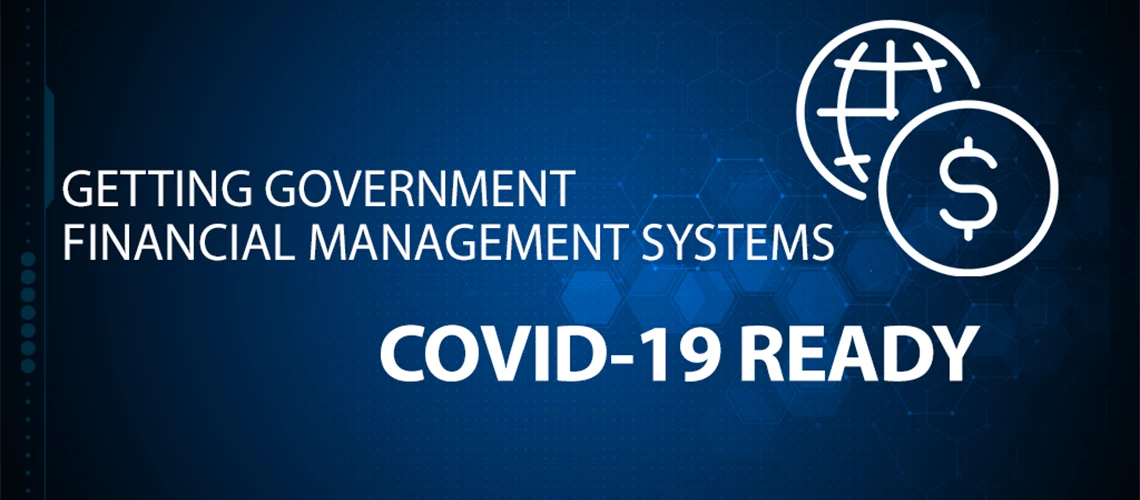 Public Financial Management Systems and COVID-19
Public Financial Management Systems and COVID-19
So far, many developing countries have been experiencing less impact from COVID-19 than more developed countries. This gives them a narrow window of opportunity to get government systems prepared for an effective response in terms of containment and mitigation. The rapidly evolving pandemic calls for extraordinary measures and a whole-of-government approach to safeguard lives, health, and livelihoods. This requires program coordination among stakeholders including Ministries of Health, Civil Aviation Authorities, Ministries of Information, and police forces, as well as subnational governments.
Past health crises in developing countries, including Ebola, SARS, and the Swine Flu, showed that accountability and transparency requirements may need to be modified during emergency situations, but should be not done away with. Public financial management (PFM) systems need to be responsive and flexible, while ensuring value for money and minimizing fraud and corruption. Developing countries could make several quick fixes now to ensure that their PFM systems best support COVID-19 responses.
1. Funding COVID response should be quick and clear. A reallocation of existing resources may be necessary and can be done through transfers or supplementary budgets. Additional resources can be drawn from contingency funds or national disaster funds (where these exist). In many jurisdictions, transfers or reallocations can be done (subject to limits) with minimal administrative processes, which allows for immediate action, unlike using supplementary budgets. Donor funding, an important source in some countries, can be efficiently optimized when routed through the country systems. Ministries of Finance and Health should work together to ensure that the total funding envelope is appropriately identified and based on quick costing estimates. Many countries use enterprise resource planning applications to run their financial management information systems (FMIS), which are adaptable to introduce appropriate budgeting and accounting codes within existing structures, thus enabling capture of allocations and expenditures to respond to COVID-19.
2. Controls should be reoriented, not diluted. Some controls related to COVID-19 may need to be reoriented to delegate authority and expedite implementation. Adequate PFM systems can accommodate this during emergency situations. If such protocols do not exist, the guiding principles of controls need to be reoriented, based on a risk assessment. Wherever ex-ante controls are reduced, these need to be replaced with clear, explicit, and credible expectations of ex-post controls.
3. Efficient cash management is crucial. In countries where a treasury single account (TSA) is already in operation, the government has an overall picture of cash available at any point in time and is in a better position to manage cash and ensure liquidity for COVID-19 operations. In cases where large sums of government cash is sitting in commercial bank accounts, it may be appropriate for the Ministry of Finance to quickly collect, aggregate, and establish processes to move funds into bank accounts. For donor funds, in order to ring-fence this money and enhance donor confidence that it will not be mixed with government funds for ongoing expenditures, separate bank accounts could be created as linked accounts to the TSA.
4. Efficient and accountable procurement is needed. The COVID-19 response could warrant more use of single-source procurement with known and trusted suppliers to expedite the process. In such situations, it would be prudent for the Ministry of Finance and/or the procurement regulator to issue additional guidance on how to manage this process, including the potential for change orders. Monitoring international and domestic markets for price comparisons and timely actions could be useful. To mitigate the risks of fraud, it is especially important to maintain audit trails and acceptance of goods/services by responsible officials. In some cases, it may be necessary to do away with some standard requirements like bid securities and guarantees, though this needs to be documented with appropriate justification. Whenever possible, pre-existing framework contracts can be used. Posting all procurement information related to COVID-19 on government portals will enhance transparency and trust.
5. Payment management should be optimized. The emergency situation is likely to constrain liquidity. Hence greater emphasis on optimal use of cash float and credit lines is necessary. The normal payment processes of invoicing, goods / services receipts, and payments can be reviewed, both at the implementing line ministry and the Ministry of Finance, to explore how best to use the time frame allowed by creditors in making payments. In other cases, additional or higher advances may be required by contractors or sellers of goods and services, for which limits need to be established. At the frontline, service delivery units can use mobile money systems to ensure that smaller amounts are recouped quickly. Payments made outside the IFMIS system need to be recorded ex-post in IFMIS with minimal time lag.
6. Internal audit could compensate for some ex-ante controls. Internal audits could be used as a compensatory control to establish “concurrent post audit” to compensate for any pre-audit requirements that are modified. The internal audit function could temporarily reduce its role in systems reviews to focus on conducting post audit of transactions, with little time lag.
7. Financial reporting for timely assurance. Where separate budget lines are created for COVID-19 response, they need to follow the standard financial reporting system (IPSAS or national standards). Governments can benefit from more frequent interim reporting on the specific lines for decision-making.
8. The supreme auditing institution (SAI) needs to stand ready. Audit of emergency transactions by a government’s SAI provides broader reassurance on the value for money spent during emergency operations and helps identifies actions to strengthen systems for the future. SAI auditors need to independently decide on the nature, scope, and approach to COVID-19; and they should conduct their audit with minimal time lag after restoration of normalcy. To be able to conduct it, SAI needs to keep abreast of the modifications done to PFM systems and identify potential risk areas.






Join the Conversation